We, the People of Europe?
TRANSLATION | TRANSNATION
SERIES EDITOR EMILY APTER
Writing Outside the Nation
BY AZADE SEYHAN
The Literary Channel: The Inter-National Invention of the Novel
EDITEDBYMARGARETCOHENAND CAROLYNDEVER
Ambassadors of Culture: The Transamerican Origins of Latino Writing
BYKIRSTENSILVAGRUESZ
Experimental Nations. Or, the Invention of the Maghreb
BY RDA BENSMA A
A
What Is World Literature?
BYDAVID DAMROSCH
The Portable Bunyan: A Transnational History of The Pilgrims Progress
BY ISABEL HOFMEYR
We, the People of Europe? Reflections on Transnational Citizenship
BYTIENNE BALIBAR
TIENNE BALIBAR
We, the People of Europe?
Reflections on Transnational Citizenship
TRANSLATED BY JAMES SWENSON
PRINCETONUNIVERSITYPRESS
PRINCETON ANDOXFORD
Copyright 2004 by tienne Balibar
The French edition of this book, Nous, citoyens dEurope: Les Frontires, ltat, le peuple, was published by Editions la Dcouverte in 2001. Some essays have been dropped and others added for the English edition.
Published by Princeton University Press, 41 William Street, Princeton, New Jersey 08540 In the United Kingdom: Princeton University Press, 3 Market Place, Woodstock,
Oxfordshire OX20 1SY
All Rights Reserved.
Library of Congress Cataloging-in-Publication Data
Balibar, Etienne, 1942
[Nous, citoyens dEurope. English]
We, the people of Europe? : reflections on transnational citizenship / tienne Balibar ; translated by James Swenson.
p. cm. (Translation/transnation)
Includes bibliographical references and index.
eISBN: 978-1-40082-578-3
1. CitizenshipEurope. 2. Political rightsEurope. I. Title. II. Series.
JN40.B3513 2004
323.6094 dc22 2003055450
British Library Cataloging-in-Publication Data is available
Publication of this book has been aided by the French Ministry of Culture Centre National du Livre
Cover photo by Lies l Ponger, courtesy of Charim Galerie
This book has been composed in Minion with Gill Sans display
Printed on acid-free paper.
www.purpress.princeton.edu
Printed in the United States of America
10 9 8 7 6 5 4 3 2 1
CONTENTS
PREFACE
This book is the American equivalent to the volume published in France with the title Nous, citoyens dEurope? Les Frontires, ltat, le peuple. Third, two substantial essays included in this volume have no equivalent in the French volume because they were written after its completion. They now form my last two chapters: Democratic Citizenship or Popular Sovereignty? and Europe: Vanishing Mediator?"
As a consequence, the organization of the book has been reconsidered: it is no longer made of separate parts with specific summaries and introductions. Instead, the chapters are presented in continuous succession, with an Ouverture (my address to the University of Thessalonki in 1999) and a Finale (my George L. Mosse Lecture from November 2002, also originally addressed to a European audience but as a public reply to what I perceived as an interpellation to Europe coming from American intellectuals). In this manner, I hope that the goals of the volume have gained clarity. As will become clear from a progressive reading, many of the peculiarities of my arguments are dependent on the circumstances, dates, places, kinds of audiences that specified each of the essays. This results from my conviction, now firmly rooted, that political matters cannot be examined from a deductive point of view (be it moral, legal, philosophical, sociological, or some combination of these), but can only be theorized under the constraints imposed by the situation and the changes in the situation that one observes or tries to anticipate. This is not to say that the discourse remains purely descriptive or empirical, but thatprecisely in order to be theoretical in the way that the political matter requiresit has to incorporate as much as possible a reflection on its immediateconditions, which determine the understanding and use of concepts. This method could be called clinical: it combines the epistemological interrogation of the speculative categories that we use in political philosophy (such as borders and territories, state, community and public structures, citizenship and sovereignty, rights and norms, violence and civility) with a consistent affirmation that only singular forces, unpredictable events, and dialectical evolutions actually shape history. Far from preventing us from concentrating on fundamental issues, it doesso I believeactually allow the progressive clarification of a central problem and its logical and practical implications.
The central problem throughout these essays is what I call transnational citizenship, which I try to distinguish carefully from the idea of both supranational and postnational citizenship. I would not deny that this problem is raised precisely by the way in which European unification (certainly not reducible to a mere effect of globalization, which would tend to create political units larger than the traditional nations) has progressively divorced the two concepts of citizenship and nationhood that the classical state practically identified. But I think that what has emerged is neither a reproduction of the same constitution of citizenship (my equivalent for the classical Greek term politeia) at a supranational level (not even in the form of a federal citizenship in a federal state), nor a dissolution of the notions of community and people in a postnational cosmopolitical society. There are indeed supranational structures (above all in the form of administrations and representative bodies) and there are postnational cosmopolitical anticipations (in particular, the attempt to create a political identity that is open to continuous admission of new peoples and cultures) in the construction of Europe.But the basic problems result from an open process of immanent transformation of national identity, national sovereignty, and national membership, which I tentatively call the transnationalization of the political, whose results are not really predictable.
In the following essays, I have put considerable insistence on the idea that this process, albeit necessary (if only because European unification has reached a point of irreversibility, where it becomes a condition for the very continuation of the different nations and states that it transcends), meets with considerable obstacles. I have even used the terms crisis and critical point. This can give the impression that I look at the current processes with a skeptical or pessimistic eye. In fact, I am neither pessimistic nor optimistic, but I try to understand what the elements of the historical dialectic in this critical conjuncture have become.
From a theoretical point of view, the obstacles are concentrated around the fact that a European Constitution sharpens the classical debate between the different ways of laying the foundations for a democratic state (by referring either to the existence of a people within its territorial limits and with its own history or to the basic rights and constitutional rules that organize the distribution of powers and legitimize the form of government) but, more important, radically reopens thediscussion on the notion of sovereignty. For historical and structural reasons, a Europeanconstitution of citizenship can only emerge on the condition of being more democratic than the traditional constitutions of the national statesor it will be deprived of any legitimacy, any capacity to represent the populations and solve (or mediate) their social conflicts (be they conflicts of economic interests or cultural-religious loyalties). In a sense therefore, a European constitution of citizenship has to take decisive steps
Next page
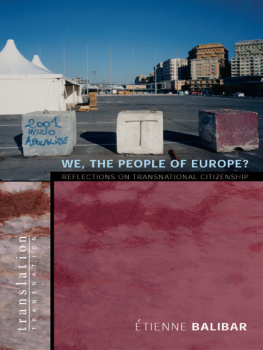
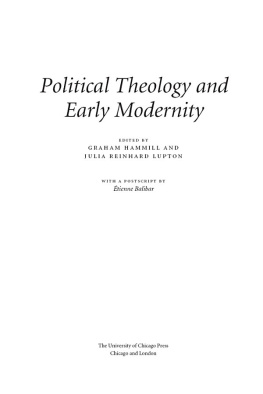

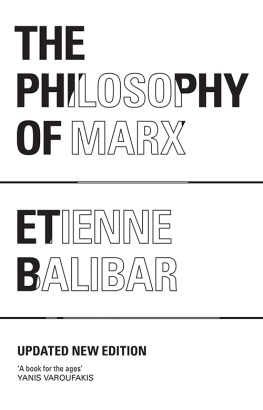

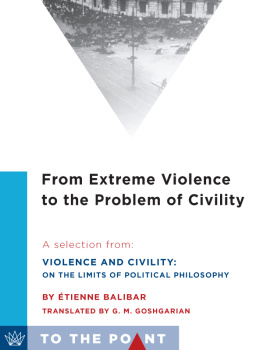
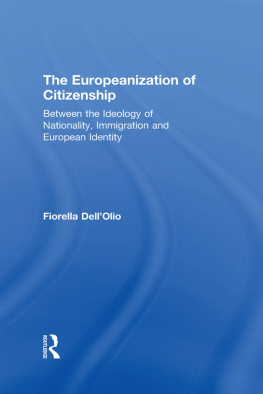
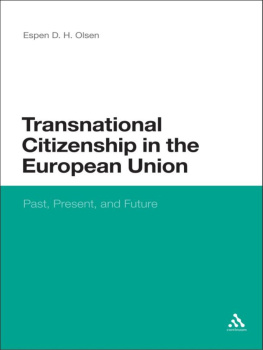
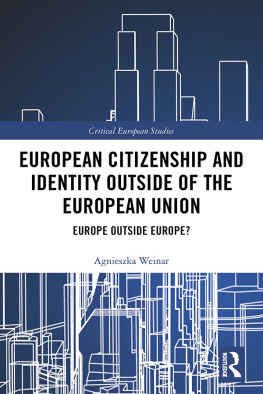

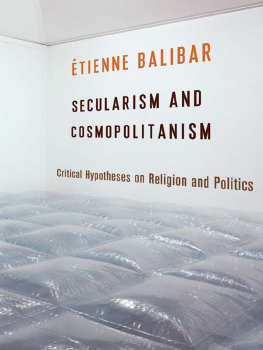
 A
A